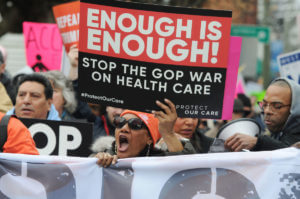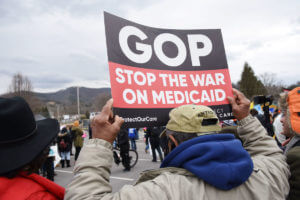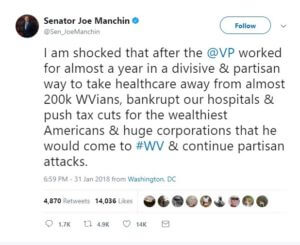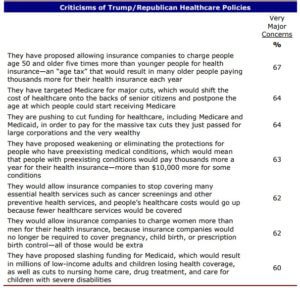To: Interested Parties
From: Geoffery Garin
Subject: Health Care As A Defining Issue Of 2018
Date: January 12, 2018
——————————————————————————————————————————————-
Our newly completed survey among a representative national cross section of voters clearly shows that healthcare will be a defining issue in the 2018 elections and the healthcare policies of President Trump and the Republican Congress will be a very significant liability for GOP candidates.
These findings are based on 1,000 interviews nationwide conducted January 3 to 7, 2018, among a sample of 2016 voters, 49% of whom say they voted for Hillary Clinton and 46% of whom say they voted for President Trump.
1. Healthcare far exceeds any other issue as an important driver of voting preferences, with over half of all voters identifying healthcare as one of their top priorities in the 2018 congressional elections.
Fully 54% choose healthcare as one of the two issues that will be the most important to them in deciding how to vote for Congress, compared with 29% for the economy, 28% for taxes, 18% for immigration, 18% for education, 17% for government spending, 12% for national defense, and 11% for terrorism.
These results highlight the durability of healthcare as a powerful concern for voters, even when healthcare legislation is not front and center in the news. In our two previous readings in May 2017 and August 2017, 55% and 57% respectively selected healthcare as one of their top two issues.
Healthcare is the most frequently cited priority among Democrats (68%), independents (54%), and Republicans (38%). It is particularly important to African-American voters (66%) and to white women voters, whether they are college graduates (62%) or non-college graduates (59%).
2. Along with the tax bill, healthcare policies are a top-of-mind reason that many voters disapprove of the job Republicans are doing as the majority party in Congress. Indeed, there is widespread disapproval of Republicans in Congress with regard to their handling of healthcare, even among many rank-and-file Republican voters.
Even after the passage of the tax bill, fully 61% of voters disapprove of the job Republicans are doing as the majority party in Congress. When those who disapprove are asked to volunteer why, they most frequently mention Republican tax policies (43%), Republican healthcare policies (36%), and the Republicans’ general lack of concern for average Americans (11%).
While disapproval for the Republicans’ overall performance is high, disapproval for the GOP’s performance on healthcare is even higher (72%). Negative opinions about the way Republicans in Congress have handled healthcare cross party lines, with 93% of Democrats, 78% of independents, and 45% of rank-and-file Republicans expressing disapproval.
3. Republicans’ efforts to repeal and replace the Affordable Care Act are unpopular with voters and a political drag on them in this election year. Democrats increase their electoral advantage when they highlight their position of making improvements in the ACA while keeping what works. And it is clear that continued GOP efforts to repeal the ACA will exacerbate their political problems, given that two-thirds of voters agree on this issue that, “enough is enough.”
Just 35% of voters say they have a favorable opinion of the bills proposed by Republicans in Congress to repeal the Affordable Care Act, while 52% have an unfavorable opinion of them. By 47% to 38%, voters say they would be less likely to reelect their members of Congress if they voted for the bills by President Trump and Republicans in Congress to repeal and replace the ACA. Voters who are undecided on how to vote for Congress this year say by 12 points that they would be less likely to reelect someone who voted for repeal and replace.
Additionally, the poll results indicate that there is widespread frustration with Republicans’ repetitive efforts to repeal the Affordable Care Act. Fully 68% of voters agree with this statement: “Enough is enough—President Trump and the Republicans in Congress should stop trying to repeal and undermine the Affordable Care Act and start working across party lines on commonsense solutions that build on the current law.” Fifty-three percent (53%) strongly agree. There has been a 10-point increase in the share of voters who see President Trump as actively trying to make the Affordable Care Act fail (to 52%, with 28% saying he is not trying to make it fail and 20% not sure). By 55% to 45%, voters say problems with the Affordable Care Act are occurring mainly because Trump and Republicans in Congress are trying to sabotage the law rather than because it is a bad law.
As other polls have shown, Democrats head into the 2018 midterm elections with a clear advantage. In this poll, among all voters who cast ballots in the 2016 presidential election, Democrats have a seven-point margin (44% Democrat, 37% Republican) in a generic trial heat. The Democrats’ true advantage likely will be much greater, given that 75% of Clinton voters say they are certain to vote in 2018, compared with just 60% of Trump voters.
An election that focuses on healthcare and GOP repeal efforts would widen the Democrats’ margin. When given a choice between a Democrat who wants to keep what works in the Affordable Care Act and make improvements in it and a Republican who wants to repeal and replace Obamacare, voters prefer the Democrat by 18 points (59% to 41%). Those who are undecided in the generic trial heat prefer the Democrat in this
match-up by 68% to 32%.
4. The Republicans have a long list of severe vulnerabilities on healthcare that go beyond their repeated efforts to repeal the Affordable Care Act, and their healthcare policies on many fronts create very major concerns among large majorities of voters. These are the highest testing criticisms of the healthcare policies of President Trump and the Republicans in Congress.
These are the highest testing criticisms of the healthcare policies of President Trump and the Republicans in Congress.

Sixty-nine percent (69%) of women voters voice very major concerns about GOP policies that would allow insurance companies to charge women more than men for their health insurance. Other Trump policies are widely rejected by voters. The reaction is especially negative, for example, when voters are informed that, “the Trump administration is allowing insurance companies to sell plans that do not meet the requirements of the Affordable Care Act because they do not have to cover essential health benefits such as cancer treatments and maternity care and can deny coverage altogether for preexisting conditions.” Three quarters of all voters disapprove of this policy, including 53% who strongly disapprove.
5. The litany of bad Republican policies on healthcare ladders up to a very damaging overarching narrative for the GOP. Indeed, a large majority agree that the sum of the Trump-GOP policies shows that there is a “Republican war on healthcare.” Just as important, the healthcare issue focuses attention on two dominant weaknesses for the Republicans—their reputation for catering to special interests, and their support for a tax bill that gave huge cuts to the wealthy and large corporations.
Seventy-four percent (74%) of voters agree with the following statement, including 51% who strongly agree: “When you add it all up—taking away coverage from millions of people, weakening protections for people with preexisting conditions, allowing insurance companies to charge more if you are older or a woman, and making big cuts to Medicare and Medicaid—there is a Republican war on healthcare today.” Even 48% of Trump voters agree that there is a Republican war on healthcare.
The notion of a Republican war on healthcare is credible to voters because it speaks to two other important conclusions voters have about Republicans:
-
They take huge amounts of campaign funding from the insurance industry and the pharmaceutical industry, and they are catering to the special interests that give them money (77% say this is believable, including 51% who say it is very believable).
-
They want to cut funding for healthcare in order to pay for the huge tax cuts they passed for the wealthy and large corporations (72% say this is believable, including 48% who say it is very believable).
While voters also believe that Republicans in Congress are motivated by a desire to undo everything that President Obama did while he was in office, even more concerning to them are the GOP’s focus on cutting taxes for the wealthy and the large corporations and its desire to cater to the special interests that fund their campaigns.








